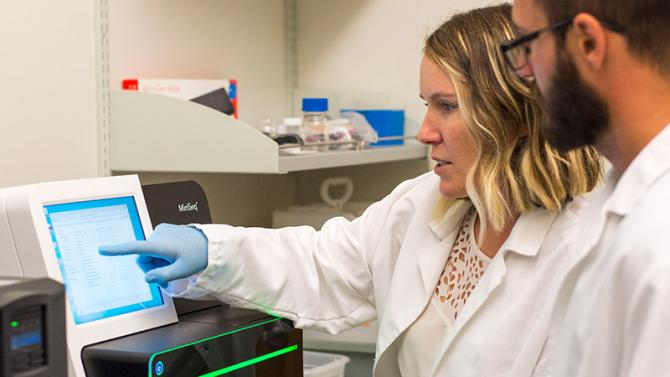Microbiology
Bailey College of Science and Mathematics
Microbiology is the study of organisms that are too small to be seen with the naked eye — including bacteria, viruses, fungi, and protists — and their impact on the larger world.
San Luis Obispo, California
Microbiology majors will take specialized courses in medical microbiology, immunology, microbial physiology, genetics, virology, and cell biology. In close consultation with your faculty advisor, you will also choose elective courses related to your individual interests and career goals.
More than three-fourths of our courses include a lab section. Examples include:
- Cell Biology
- Cell and Molecular Biology
- Ecology and Evolution
- Food and Wine Microbiology
- Gene Expression
- Immunology
- Medical Microbiology
- Microbial Physiology
- Virology
A wide variety of undergraduate research opportunities in faculty labs are also available outside of course work or for credit.
About the Program
Studying microbiology allows you to explore the world of microorganisms and study life on a molecular level.
In the lab, you will manipulate microorganisms and gain a first-hand understanding of microbial cell structure and function, metabolism, genetics and ecology. As an undergraduate, you can also work directly with faculty members on research in California and around the world which allows you to gain real-world experience and knowledge. Many faculty research projects are funded by grants from the National Science Foundation and other government organizations.
Learn by Doing
From tracking microbial communities in soil to analyzing genetic material, you will have opportunities to put your skills to the test and engage in hands-on learning. This knowledge base allows you to learn how to do things such as ensure our food is safe, treat and prevent disease, develop green technologies or track the role of microbes in climate change.

Sequence a Genome
Our Graduates
A degree in microbiology prepares you for graduate school, professional studies or careers in industrial microbiology, food and dairy microbiology, biotechnology, public health, or epidemiology programs. Graduates may also pursue certification as a Clinical Laboratory Scientist or Public Health Microbiologist.
